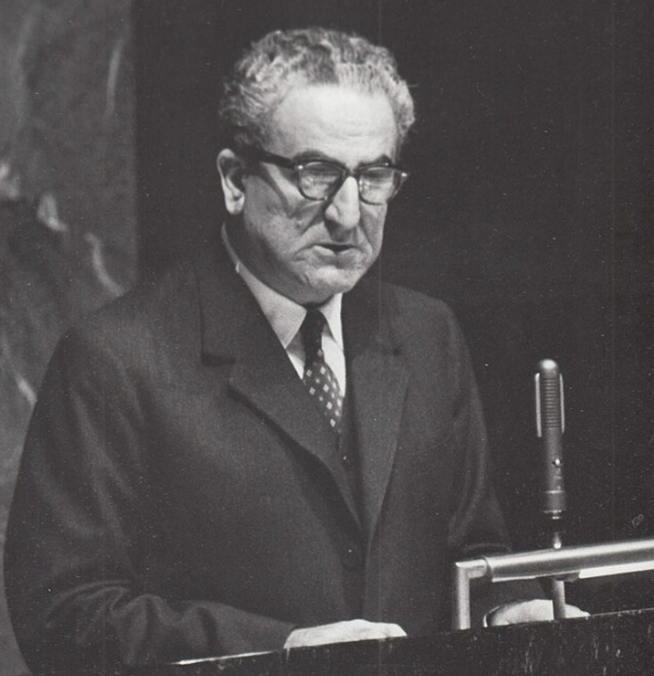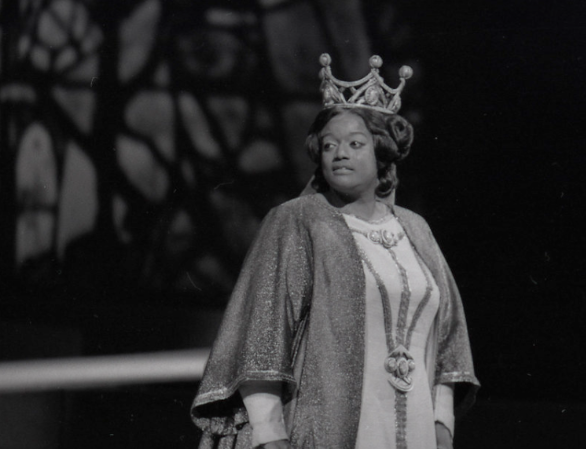
Charles Habib Malik’s ecumenical vision
Charles Habib Malik (1906-1987) was an influential Lebanese academic, diplomat, philosopher and politician. Born into an Orthodox Christian family in the mountains of Lebanon, he grew up during the Ottoman rule. His academic journey began at the American University of Beirut. He then continued his studies at Harvard, where he studied philosophy under Alfred North Whitehead , a leading thinker in the fields of logic and metaphysics. Malik’s intellectual quest also took him to Freiburg, where he immersed himself in the metaphysics of Martin Heidegger, one of the most influential philosophers of the twentieth century. Malik’s broad philosophical knowledge and diplomatic skills played an important role in his contribution to the drafting of the Universal Declaration of Human Rights.
Plea for freedom of belief
Malik had a deep-rooted ecumenical vision and sought to bridge the gap between religious communities. This approach made him an inspiring figure in both diplomatic and theological circles. During the creation of the Universal Declaration of Human Rights (UDHR), he engaged in spirited, philosophical discussions with Peng Chun Chang, the nationalist Chinese delegate, and Eleanor Roosevelt, among others. Their debates, particularly on the issue of religious freedom, laid an important foundation for the content of the UDHR.
Malik emphasized that no one can speak on behalf of God, although some still dare to pretend that they can. Whether or not a person believes in God, he said, is a personal matter, beyond the scope of the UDHR. Article 18 of the UDHR, which deals with freedom of thought, conscience and religion, reflects his ideas. The article guarantees the freedom to choose a faith or change faith, and to express it both publicly and privately through education, rituals, worship and adherence to religious rules. Malik strongly believed in the importance of mutual understanding and respect for each other’s differences, especially at a time of increasing polarization. He believed it was crucial to distinguish between the dignity of human beings – which is always preserved – and people’s behavior, which can be judged when it crosses the law.
Malik’s vision today
In everyday life, we can expect each other to be considerate of the other and respect each other’s views, while also leaving room for different opinions and beliefs. This mutual respect provides the opportunity to build trust in dealing with others. Malik’s call for caring for the weak and an attitude of give and take can be seen as a Christian way of life, but he emphasized that one can come to the same conclusion from another worldview. His message remains relevant and sobering in these times of division.
Read more:
- Website with biography of Charles Malik. Accessed 16/9/2024.
- The Universal Declaration of Human Rights (UDHR) via the Amnesty website. Accessed 15/9/2024.
Recente bijdragen
Racism in opera – avoid clichés and commit to inclusiveness
Taking racial elements out of opera Reading time: 5 minutes. Avoiding racial stereotypes in opera requires a thoughtful approach. Directors may […]
Back from the road – Florida
Florida Was Wonderful I don’t love America as a power, but I adore Americans. The way they interact with each other—we cold […]
Back from the road – France
I am back again, after spending time away in France. The Loire, with all its magnificent châteaux, left me breathless. There I sat, on a […]
Alle auteurs
- collage
- Advice from the doctor
- African poetry
- AIDS activism and gay emancipation
- Bibliography of Chris
- Bibliography of Olivier
- Biography of Chris
- Biography of Olivier
- Biography of Patrick
- Blogs
- Chris' Stage
- Columns
- Covid
- Dirk van Babylon Newsletter
- Double calling
- Essays
- Hanna's Mind Wanderings
- Incapacity for work
- LEIF doctor
- Liechtensteiner
- Medical newsletter
- Memoirs of a general practitioner
- Miguel Molinos
- Moctines
- Musings
- Myriad
- Practice in Erembodegem
- Resignation
- Sleep problems
- Sprawl Month
- Substance abuse and addiction
- Travel
- Vi to
- Vögels
- Voluntary euthanasia
- Weltschmerz
- Wormwood
- fourth dimension
- Advice from the doctor
- African poetry
- AIDS activism and gay emancipation
- Bibliography of Chris
- Bibliography of Olivier
- Biography of Chris
- Biography of Olivier
- Biography of Patrick
- Blogs
- Chris' Stage
- Columns
- Covid
- Dirk van Babylon Newsletter
- Double calling
- Essays
- Hanna's Mind Wanderings
- Incapacity for work
- LEIF doctor
- Liechtensteiner
- Medical newsletter
- Memoirs of a general practitioner
- Miguel Molinos
- Moctines
- Musings
- Myriad
- Practice in Erembodegem
- Resignation
- Sleep problems
- Sprawl Month
- Substance abuse and addiction
- Travel
- Vi to
- Vögels
- Voluntary euthanasia
- Weltschmerz
- Wormwood
- microfiction
- Advice from the doctor
- African poetry
- AIDS activism and gay emancipation
- Bibliography of Chris
- Bibliography of Olivier
- Biography of Chris
- Biography of Olivier
- Biography of Patrick
- Blogs
- Chris' Stage
- Columns
- Covid
- Dirk van Babylon Newsletter
- Double calling
- Essays
- Hanna's Mind Wanderings
- Incapacity for work
- LEIF doctor
- Liechtensteiner
- Medical newsletter
- Memoirs of a general practitioner
- Miguel Molinos
- Moctines
- Musings
- Myriad
- Practice in Erembodegem
- Resignation
- Sleep problems
- Sprawl Month
- Substance abuse and addiction
- Travel
- Vi to
- Vögels
- Voluntary euthanasia
- Weltschmerz
- Wormwood
- Olivier Lichtenberg
- Advice from the doctor
- African poetry
- AIDS activism and gay emancipation
- Bibliography of Chris
- Bibliography of Olivier
- Biography of Chris
- Biography of Olivier
- Biography of Patrick
- Blogs
- Chris' Stage
- Columns
- Covid
- Dirk van Babylon Newsletter
- Double calling
- Essays
- Hanna's Mind Wanderings
- Incapacity for work
- LEIF doctor
- Liechtensteiner
- Medical newsletter
- Memoirs of a general practitioner
- Miguel Molinos
- Moctines
- Musings
- Myriad
- Practice in Erembodegem
- Resignation
- Sleep problems
- Sprawl Month
- Substance abuse and addiction
- Travel
- Vi to
- Vögels
- Voluntary euthanasia
- Weltschmerz
- Wormwood
- Pasquino
- Advice from the doctor
- African poetry
- AIDS activism and gay emancipation
- Bibliography of Chris
- Bibliography of Olivier
- Biography of Chris
- Biography of Olivier
- Biography of Patrick
- Blogs
- Chris' Stage
- Columns
- Covid
- Dirk van Babylon Newsletter
- Double calling
- Essays
- Hanna's Mind Wanderings
- Incapacity for work
- LEIF doctor
- Liechtensteiner
- Medical newsletter
- Memoirs of a general practitioner
- Miguel Molinos
- Moctines
- Musings
- Myriad
- Practice in Erembodegem
- Resignation
- Sleep problems
- Sprawl Month
- Substance abuse and addiction
- Travel
- Vi to
- Vögels
- Voluntary euthanasia
- Weltschmerz
- Wormwood
- Patrick Bernauw
- Advice from the doctor
- African poetry
- AIDS activism and gay emancipation
- Bibliography of Chris
- Bibliography of Olivier
- Biography of Chris
- Biography of Olivier
- Biography of Patrick
- Blogs
- Chris' Stage
- Columns
- Covid
- Dirk van Babylon Newsletter
- Double calling
- Essays
- Hanna's Mind Wanderings
- Incapacity for work
- LEIF doctor
- Liechtensteiner
- Medical newsletter
- Memoirs of a general practitioner
- Miguel Molinos
- Moctines
- Musings
- Myriad
- Practice in Erembodegem
- Resignation
- Sleep problems
- Sprawl Month
- Substance abuse and addiction
- Travel
- Vi to
- Vögels
- Voluntary euthanasia
- Weltschmerz
- Wormwood
- stiftgedicht
- Advice from the doctor
- African poetry
- AIDS activism and gay emancipation
- Bibliography of Chris
- Bibliography of Olivier
- Biography of Chris
- Biography of Olivier
- Biography of Patrick
- Blogs
- Chris' Stage
- Columns
- Covid
- Dirk van Babylon Newsletter
- Double calling
- Essays
- Hanna's Mind Wanderings
- Incapacity for work
- LEIF doctor
- Liechtensteiner
- Medical newsletter
- Memoirs of a general practitioner
- Miguel Molinos
- Moctines
- Musings
- Myriad
- Practice in Erembodegem
- Resignation
- Sleep problems
- Sprawl Month
- Substance abuse and addiction
- Travel
- Vi to
- Vögels
- Voluntary euthanasia
- Weltschmerz
- Wormwood
Over de auteur
Andere werken van onze auteurs
- August 2025 (1)
- July 2025 (2)
- March 2025 (3)
- December 2024 (10)
- November 2024 (6)
- October 2024 (3)




Er is nog geen commentaar geplaatst!